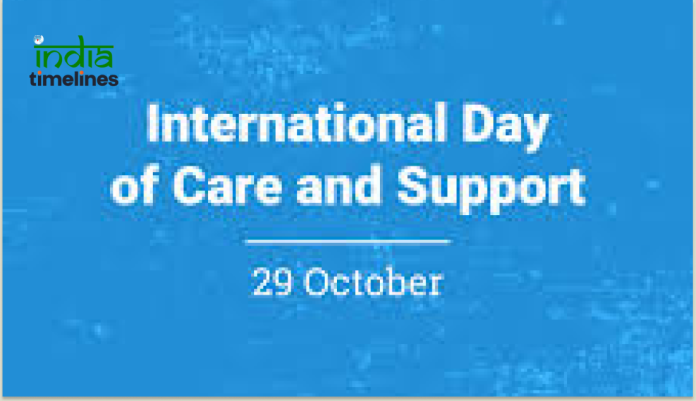
Care and support are fundamental pillars of human connection, crucial to the well-being of individuals and communities alike. Recognizing this, the International Day of Care and Support, celebrated annually, serves as a global reminder of the importance of caring for one another, fostering a culture of compassion, and addressing the diverse needs of people worldwide. Whether it’s through emotional, physical, or social support, this day brings awareness to the significance of care in creating a more inclusive and empathetic world.
The Origins and Purpose of the International Day of Care and Support
The International Day of Care and Support was established to underscore the need for global solidarity in addressing care needs across all sectors of society. It shines a spotlight on the critical roles played by caregivers, healthcare professionals, social workers, family members, and communities in providing care and support to those who need it most. The day also highlights the challenges that caregivers face and the need for societal and governmental policies that ensure adequate resources and recognition for their efforts.
Care and support are not only fundamental to individual health and happiness but are also essential for social cohesion. This global observance calls on people to reflect on how they can contribute to building a culture of care—whether by supporting aging populations, offering assistance to people with disabilities, or advocating for mental health resources.
The Scope of Care and Support
Care and support take many forms, ranging from professional healthcare to informal, everyday acts of kindness. This concept is universally applicable, transcending borders, cultures, and socioeconomic conditions. Care is not limited to the healthcare sector but extends into education, social services, and even economic development. For instance, children require care and support to thrive in school environments, while the elderly and people with chronic illnesses often rely on long-term care services.
- Healthcare and Medical Support: One of the most visible forms of care is in healthcare settings, where doctors, nurses, and other medical professionals provide critical support to patients. This care can be life-saving and ranges from emergency treatments to ongoing management of chronic conditions. Beyond hospitals and clinics, home healthcare services allow patients to receive personalized care in their own homes, improving quality of life and reducing the need for extended hospital stays.
- Mental Health Support: Mental health is an area that has garnered increasing attention in recent years, as societies recognize the importance of addressing psychological and emotional well-being. Mental health care includes therapy, counseling, and community support systems aimed at helping individuals cope with stress, anxiety, depression, and other psychological conditions. Mental health advocates use the International Day of Care and Support to raise awareness about the need for accessible mental health resources and to reduce the stigma associated with mental health issues.
- Support for the Elderly: As populations around the world age, there is an increasing demand for caregiving services tailored to the needs of elderly individuals. Elder care encompasses a wide range of services, including medical care, physical assistance, emotional support, and companionship. Many elderly people rely on family members or professional caregivers to help them with daily tasks such as dressing, bathing, and meal preparation, especially when they suffer from conditions like dementia or mobility issues.
- Care for People with Disabilities: Individuals with disabilities require specialized care and support to live fulfilling and independent lives. This can involve medical treatments, physical therapy, assistive technologies, and adaptations to the environment, such as ramps and accessible transportation. Caregivers who assist people with disabilities play a critical role in fostering inclusivity and empowering individuals to participate in society to the fullest extent possible.
- Child Care and Education: Children are among the most vulnerable members of society and require substantial care and support to ensure their physical, emotional, and intellectual development. Childcare providers, teachers, and social workers are all integral to providing this support, whether through daycare services, after-school programs, or in-school counseling. Additionally, many children require special attention due to learning disabilities, trauma, or family challenges.
- Community and Social Support: Communities offer a wide array of support mechanisms that often go unnoticed but are vital for social well-being. From food banks and homeless shelters to support groups for addiction recovery, these community-based organizations provide essential services that care for society’s most marginalized members. On the International Day of Care and Support, many communities come together to volunteer their time, raise funds, or spread awareness about the importance of supporting local social services.
Challenges Facing Caregivers
Despite the crucial role caregivers play, they often face significant challenges, both personally and professionally. Caregiving can be emotionally draining, physically demanding, and financially burdensome. In many cases, caregivers do not receive adequate support from governments or employers, and caregiving responsibilities can affect their mental health, career prospects, and social lives.
- Emotional and Physical Strain: Many caregivers, particularly family members who provide informal care, face emotional burnout. The constant need to attend to a loved one’s health and well-being can leave caregivers feeling isolated and overwhelmed. Additionally, providing physical assistance to someone who is elderly or disabled can be physically taxing, especially if the caregiver is also aging or in poor health.
- Financial Burden: Caregiving can also take a financial toll, especially when family members need to cut back on work hours or leave their jobs altogether to provide full-time care. Medical expenses, the cost of home modifications, and the price of medications or assistive devices can all add up, placing an additional burden on already stretched resources.
- Lack of Recognition: Despite their essential contributions, caregivers often go unrecognized and unsupported. Many countries do not offer adequate social services or financial assistance for caregivers, leaving them to navigate their roles without sufficient backing. On the International Day of Care and Support, advocates push for better policies that provide financial compensation, mental health support, and respite care for caregivers.
- Balancing Work and Caregiving: Many people who provide care to family members or friends also have full-time jobs, making it challenging to balance both responsibilities. Without flexible work arrangements or adequate paid leave, these individuals can experience stress and exhaustion. In recognition of this, some companies and countries have started to offer family care leave or flexible work schedules to help employees manage their caregiving responsibilities.
Building a Culture of Care and Support
Creating a culture of care requires collective action from individuals, communities, and governments. While individual acts of kindness are valuable, systemic changes are necessary to ensure that all people receive the care and support they need.
- Government Policies and Legislation: Governments play a crucial role in establishing social safety nets that support caregiving. This can include policies such as paid family leave, caregiver stipends, and subsidized childcare or eldercare services. Additionally, government investment in healthcare infrastructure and mental health services is essential to ensuring that care is accessible to everyone, regardless of socioeconomic status.
- Corporate Responsibility: Companies also have a role to play in supporting care and caregiving. This can be achieved through flexible work policies, family leave options, and wellness programs that provide employees with access to mental health resources and stress management tools. Some companies have begun to recognize that supporting employees in their caregiving roles not only helps the individuals but also improves overall job satisfaction and retention rates.
- Community Engagement: Communities can foster a culture of care through volunteerism, support networks, and public awareness campaigns. Local organizations often serve as the first point of contact for individuals in need of assistance, and they can offer essential services such as meal delivery for the elderly, support groups for caregivers, or crisis intervention for people struggling with mental health issues.
- International Cooperation: On a global level, organizations such as the World Health Organization (WHO) and the United Nations work to promote care and support through various initiatives aimed at improving healthcare, social services, and community support systems around the world. International cooperation is especially important in addressing global challenges such as pandemics, where care and support systems are crucial in managing crises.
How You Can Participate in the International Day of Care and Support
There are many ways individuals can contribute to the International Day of Care and Support. Volunteering at a local shelter, supporting a caregiving family member, or simply offering a kind word to someone in need are all meaningful acts that promote the spirit of the day. You can also participate by donating to organizations that provide care to vulnerable populations, such as eldercare centers, mental health hotlines, or children’s charities.
In addition to personal acts of kindness, advocating for systemic change is an important way to participate. Writing to local government officials to support policies that assist caregivers or joining campaigns that raise awareness about the importance of care and support are powerful ways to make a broader impact.
India Time Lines
Conclusion
The International Day of Care and Support is more than just a day of observance—it’s a call to action for individuals, communities, and governments to prioritize care and support for all members of society. Whether through healthcare, mental health services, or everyday acts of kindness, care is essential for fostering human connection and creating a more compassionate world.
As we reflect on the importance of care and support, let us remember that we all have a role to play in building a more inclusive and supportive global community. By recognizing and celebrating the value of caregiving, we can help ensure that everyone, regardless of their circumstances, receives the care and support they deserve.




































After all, what a great site and informative posts, I will upload inbound link – bookmark this web site? Regards, Reader.